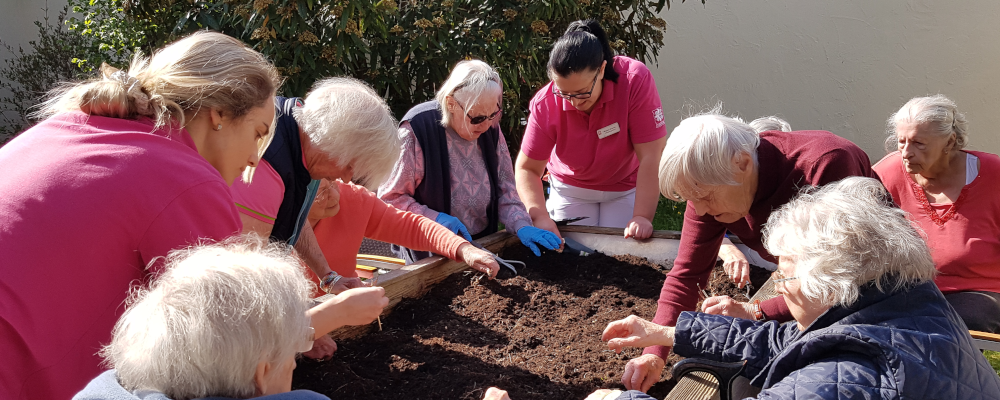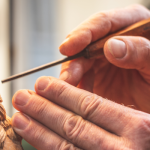Christine Baumann passes on the delicate seedlings. Old hands carefully clasp the sprout and let it slide into a hollow in the raised bed. The aspiring horticultural therapy assistant teaches senior citizens the gardening in old age. The Caritas retirement home in Krailling, near Munich, has several raised beds, while a landscaped garden and herb beds invite residents to take a stroll. But what effect does the greenery have on the residents?
What is horticultural therapy?

Horticultural therapy is the targeted use of gardening to promote physical and mental health. Simple gardening tasks such as planting, tending and harvesting appeal to the senses, evoke memories and help the body to stay fit. ‘Everyone can relate to nature,’ says Christine Baumann. She tailors the work in the garden to the individual residents: Who can still cut with scissors? Who still has the dexterity to bind a flower arrangement?
Aprons and trolleys with tools are always available at the Caritas nursing home, and the residents head out into the garden at least every 14 days. Depending on the season, they dig and work in the soil. ‘Ultimately, it’s also about achieving something,’ says Baumann. The specialists work with the residents to make tea from nettles or an ointment from marigolds.
Promoting health with gardening
Anyone who has ever dug over a bed knows that gardening strengthens muscles and joints. Grasping, planting and holding tools promotes hand-eye coordination, which is particularly valuable for older people. Gardening also promotes mobility and balance and keeps joints supple. All of this helps to prevent bumps, falls and bruises.
In Krailling, senior citizens who are confined to wheelchairs can roll right up to the raised beds, which have space underneath, and get started. But it’s not just sensorimotor skills that are supported and ideally enhanced – creativity is also called for in the flowerbed. Additionally, working in the fresh air improves the oxygen supply, which in turn strengthens the circulation. The aspiring garden therapist emphasises: ‘We want to increase well-being and work with the available resources to achieve this.’
Stress relief and mood enhancer
Contact with nature can have a calming and mood-boosting effect. Especially for older people, who often suffer from loneliness, feelings of loss and depressive moods, horticultural therapy offers a natural opportunity to improve their emotional well-being. This is because spending time in green surroundings reduces stress, and the sound of birdsong has a calming effect. Gardening also boosts self-esteem and mindfulness, as the social care worker emphasises: ‘People who are introverted often blossom when we spend time in the garden with them.’
Interaction and a sense of community
Gardening together helps to combat loneliness and promotes a sense of community. In Krailling, the garden projects are strengthening social bonds. The group enjoys making colourful autumn wreaths, filling fragrant lavender sachets or harvesting the radishes they have planted. ‘Home-grown radishes taste even better in bread!’ laughs Baumann. And the wreaths and sachets are much appreciated by relatives and housemates.
For many of today’s pensioners, the home garden was a source of food – and also a place with healing properties, where herbs such as lemon balm, sage and sorrel grew that helped to ease aches and pains. ‘Many people know quite a bit about the healing powers of garden herbs,’ the expert observes. But much of this knowledge is buried in the memory and only comes to the fore when stimulated by several senses.
Gardening as memory training
Because gardening tasks require a certain amount of planning and memory (What tools do we need? When can we plant and harvest?), gardening routines also train the memory. Memorising the types and genera of plants is like brain training. In addition, planning and observing plant growth improves cognitive abilities. What’s more, horticultural therapy appeals to all the senses. Touching damp soil, smelling herbs and tasting sweet or sour fruits can have a particularly positive effect on people with dementia.
Responsibility and a daily structure
Gardening allows older people to take on responsibility (again) and perform a meaningful task. Taking care of the plants on a daily basis gives them a sense of time and structure. This helps to increase the sense of purpose and also benefits self-efficacy. ‘Many people develop a sense of themselves again by digging in the raised bed and gain positive thoughts and feelings,’ says Baumann.


